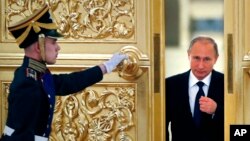Western officials are increasingly worried that Russian President Vladimir Putin's aggressive actions around the world will spread global instability and perhaps spark a backlash at home.
These officials believe Putin's real goal in joining the fight against Islamic extremists is to put Russia back at the center of the world stage. But they fear he is acting without a cohesive plan and is willing to gamble for any gains he sees within his grasp.
"Russia is increasingly assertive and unpredictable,” a NATO official told VOA on the condition he not be identified.
Such concerns have grown since Putin suggested Russia could expand its fight against groups like the Islamic State beyond Syria. The situation in Afghanistan, he has noted, is “close to critical.”
“If they [the Russians] perceive that the changing tide of the security situation in Afghanistan is deteriorating, that may increase their interest in that region,” said one U.S. official, who requested anonymity because he was not authorized to speak about the matter publicly.
Ex officials have also urged caution. Former U.S. Ambassador to Ukraine John Herbst said he thought it was "highly unlikely" that Putin would send Russian forces back into Afghanistan, "but he’s been so unpredictable, you can’t absolutely rule it out.”
“Putin represents certain predispositions of the Russian security class, but I think he’s actually proved [to be], more so than the average, a risk taker,” added Herbst, who is now with the Atlantic Council’s Eurasia Center.
Western officials acknowledge that Putin’s forces are likely able to back up any tough talk with action.
“This is not beyond the realm of their capability to operate at two places at once,” a NATO military official told VOA earlier this month.
Moves span Mideast, Asia
In Afghanistan, just as in Syria, Russia has been cultivating military ties and supplying local forces with weapons and equipment. The sale of Russian Mi-35 assault helicopters to Afghanistan is in the works.
Putin has been reaching out to other countries as well. On Friday, Russia announced an agreement with Jordan to create a center in Amman to coordinate airstrikes in Syria.
Russia has also met with Iraqi officials to talk about a weapons deal and the possibility of expanded military ties. And earlier this month, Moscow said it would sell military helicopters and equipment to Egypt in a deal valued at about $1 billion.
In other moves this month, Russia said it was sending additional attack and transport helicopters to its base in Tajikistan, and was putting 1,200 soldiers from a motorcycle brigade on alert for live-fire exercises near Volgograd.
Just this week, officials announced their intention to expand Russia’s military presence on the Kuril Islands, claimed by Japan.
A U.S. intelligence official told VOA such actions are indications of “Putin’s nostalgia for Soviet glory,” as well as a need to distract his own people.
“It would appear Putin has used military action to distract from domestic issues such as low energy prices and a stalled economy,” the official said.
Strategy has risks
Others argue Putin may simply be looking for a way out of diplomatic isolation.
“It’s the geopolitics of extortion, but it’s probably working,” said Mark Galeotti, a professor of global affairs at New York University.
“He’s identifying a whole series of potential trouble spots around the world, places that matter to the West, and is essentially indicating that he can either be a good partner, if they’re willing to make a deal with him, or he can stir up more trouble,” he said. “He’s looking to basically break out of the diplomatic isolation, the near-pariah status, that Russia has been in.”
U.S. intelligence officials say if that is Putin’s strategy, it comes with significant risks. They warn that Russia could be sucked into a Syrian quagmire reminiscent of the failed Soviet invasion of Afghanistan in the 1980s.
For now, current and former Western officials say, all indications are that the Russian leader is feeling confident he can manage the risks and restore Russia to what he feels is its rightful place on the world stage.
“I don’t imagine he’s looking to, as it were, initiate any other military or major adventures at the moment,” said NYU’s Galeotti. “The issue is whether or not he’s going to have a choice.”




